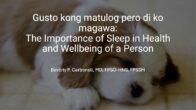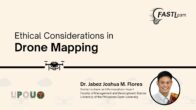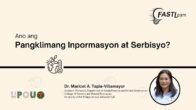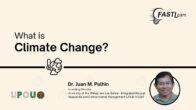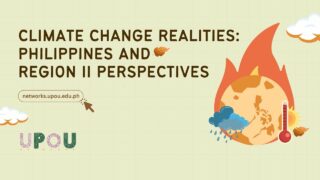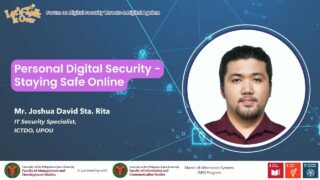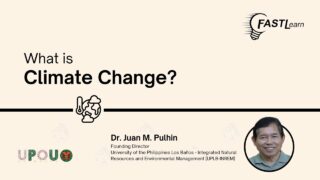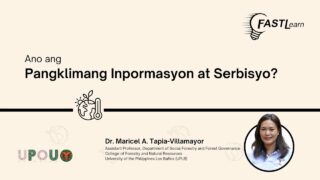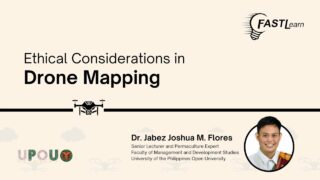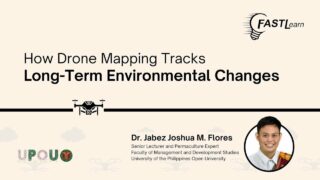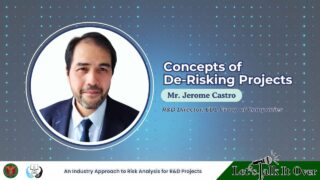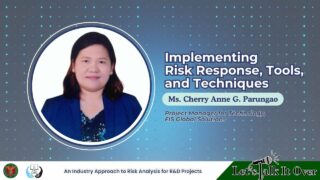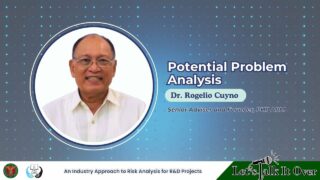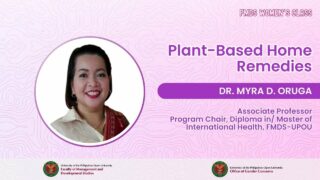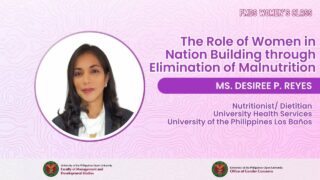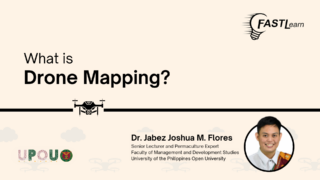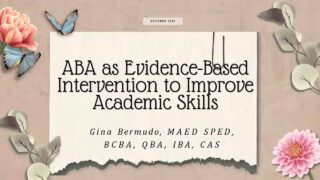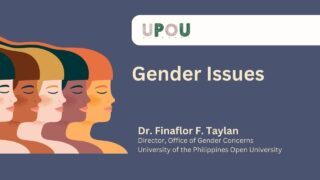So, our lecture for today is entitled, Gusto kong matulog pero di ko magawa, The Importance of Sleep Health and Well-being in a Person. So, this is my disclaimer. And the objectives for this morning’s lecture are as follows.
Number one, to raise awareness about the importance of sleep and its impact on overall health, identify common sleep disorders and its symptoms, provide practical tips and strategies to improve sleep quality, discuss the role of lifestyle, environment, and psychological factors in sleep health, and to encourage everyone to seek professional help if needed. So actually, good sleep quality is a well-recognized predictor of physical and mental health, wellness, and overall vitality.
A person is said to be at its peak of his or her vitality when they are on top of things, efficiently combining their self-care, family, and social responsibilities, yet they are healthy and capable and still energetic. Only then can one function at optimal when sleep is of good quality.
There are some that say it is a neurological state, an intermediate state between wakefulness and death. But let’s simplify it. It is reversible, it is a reversible state of perceptual disengagement and unresponsiveness to the environment. What are the characteristics of sleep? Technically, the characteristics of sleep encompass all living beings.
Activity is reduced, Stimulating response is decreased, It is reversible, Recurrent, and spontaneous. In humans, the typical posture is recumbent, mostly on our back, and the eyes are closed. It is different from other species where they are upright and their eyes are open.
For example, horses, zebras, elephants, because standing in their sleep allows them to escape predators even during sleep. So, what are the functions of sleep? First of all, sleep is restorative. It is the most accepted explanation for why we sleep. Sleep restores tissues and prepares our bodies for the next day.This may involve cleaning accumulated neurotransmitters, our brain’s other chemicals, as well as other tissue repairs that occur throughout the body.
Second is energy conservation. We sleep to conserve energy. In a sense, we are able to spend our time functioning at a lower metabolism.
So, for example, if we are awake the whole time, we may not have enough food to survive. So it allows time to create glycogen also, which is an energy store that is used by the brain as a fuel.
The third is for to regulate immune function. Specifically, cytokines, these are a type of protein that act as primary messengers of the immune system.
They send signals throughout the body to orchestrate immune responses, they turn on or turn off defense systems, and promote also different stages of sleep. So they are produced during sleep, and during sleep, it is crucial for us to get shut-eye, especially when we are sick.
Pang-apat po is memory consolidation. So basically, when we encounter or experience something important, an area of our brain called the hippocampus becomes active and works to hold that event in your short-term memory. So in order for those short-term memories to become long-term and you won’t forget them immediately, the brain needs to consolidate the information and store it outside of the hippocampus.
So when we sleep, our brain downscales the unimportant activity, irrelevant synapses, and upscales or increases activity of those important synapses. I remember this when I was in college. Classes often ask this question because those who did it to review, they didn’t answer compared to those who sleep well. This is because of memory consolidation.
Without healthy sleep including both the NREM and REM stages of sleep, negative emotional reactivity seems to be significantly enhanced. So, here, just like what the professor said, just fool the mind, don’t just wake up. This is because the positive reactions to positive events are often increased when we lack sleep.
Lastly is protective. Ongoing sleep deficiency is linked to an increased risk of heart disease, kidney disease, high blood pressure, diabetes and stroke. In other species, safety is not seen by other predators.
What are the stages of sleep? There are two stages of sleep. REM and NREM. REM means rapid eye movement stage and NREM, non rapid eye movement stage. So in the book, NREM is divided into three, previously four. So stage N1, N2, N3 and N4. Now that N3 and N4 are combined, these are the deeper stages of sleep.
In the book, the entry stage is more associated with our dreams that are in accordance to reality. For example, if you dream that you will wake up in the morning, you will go into the car, you will go into the jeep, you will go into the office. The REM of dreams, according to our book, is associated with bizarre dreams. You will jump over mountains, three mountains, you will fight in a war, things like that.
Ito po ay isang hypnogram. A hypnogram is a graphical presentation of the sleep stages. So, normal sleep progresses in a series of four or five sleep cycles. Ngayon, ano po ba ang requirements para mga sarap ang tulog? The requirements for good sleep include number one, adequate amount of sleep, number two, correct timing of sleep, and number three, good quality of sleep.
So how much sleep do we actually need? How much is enough sleep? The National Sleep Foundation is one of the pioneers for sleep science and sleep health. They recommend the following number of hours for individuals to sleep. So as we see here in this chart, adults aged 18 to 64, we have a advantage in that age group, are still advised to have 7 to 9 hours of sleep in a 24 hour period. However, let me remind you that quality supersedes quantity. And finally, for the sleep to be good, it has to occur at the right time. Pero ano po ba ang tamang oras? 9, 10, or 11?
So to understand this, I will introduce you a little to the mechanisms that maintain our sleep-wake cycle. So our sleep-wake cycle consists roughly of 8 hours of nighttime sleep and 16 hours of daytime wakefulness. As I always say, Lord made us sleep at night and wake up in the morning. Because in the morning, the sun is there. At night, the moon is there, it’s dim.
But sleep is controlled by two internal influences which is sleep homeostasis and circadian rhythm. So circadian rhythm is a system that describes our brain’s natural sleep-wake schedule. It is our internal clock. So this figure that we have here shows everyone experiences natural dips in alertness.
we are a bit sleepy in other hours and increased wakefulness during certain times in a 24 hour period it is also the circadian rhythm that dictates our natural bedtime and morning wake up schedule so once you get used to going to bed and wake up at the same time each morning our brain adapts to this schedule.
For this, we don’t have to look very far. We ourselves are examples. Right? That’s why nowadays, the tagline of sleep is for the weak. Or sometimes you also have the yolo attitude, you only live once. I have friends who say that, try not to spend too much time sleeping, because when we die, we have more than enough time to sleep.
That is why the trend today, we do everything today even those things that can be done tomorrow. So as a consequence, we lose sleep. However, knowing now how important sleep is and its benefits, maybe it’s time if we ask ourselves, is it really worth losing sleep? That’s where sleep medicine will go.
Sleep medicine is a relatively new specialty in our country. It is a medical specialty focused on optimizing health and diagnosing and treating sleep disorders and other sleep-related concerns. It has different scopes. Here it is. So let’s put it together. Sleep-related breathing disorders. These are group of disorders characterized by abnormal respiration during sleep. The most famous of this group is its obstructive sleep app. Obstructive means there is a barrier. Sleep happens when you are sleeping. In its app, there is a cessation of breathing that stops you from breathing. Because it is when the muscles relax and block the upper airway.
In the Philippines, it is known that it is approximated to be at 3.8 million Filipinos who have OSA. The second group is the central disorders of somnolence. This includes the sleep-alike disorders. The most popular disorder in this classification is narcolepsy. That is the one with sudden bouts of sleep during the normal waking hours is the circadian rhythm disorders. These are a group of sleep disorders that are characterized by a maladaptive synchronization between a person’s biological clock and the environmental 24-hour schedule. Most common that we see nowadays are shift work disorders, which we have in BPO, because they work during non-traditional hours.
Parasomia is a sleep disorder that causes abnormal behavior during sleeping. They occur during any stage of sleep. There are NREM-related and REM-related. NREM example is the Confucian Arousals. Our children are sleeping and suddenly wake up with their eyes open as if they are waking up but when you ask them in the morning, they don’t remember.
Rem related parasomia are other types of sleep disorders. While they are sleeping, they reenact their dreams. If they are in World War II, sometimes their neighbors complain because they get sleepy at night. Sleep related movement disorders this involves physical movements which may be irresistible or involuntary. They occur during sleep or even periods of rest.
So they usually create insomnia and daytime fatigue in our patients. The most common of these is the restless leg syndrome, which is characterized by unpleasant sensation deep inside the legs. Insomnia is actually the most common sleep disorder. We all probably experienced one of these types of insomnia once in our lives.
This can be acute, where it occurs for less than 3 months and chronic if more than that. So individuals who complain of insomnia reported to have repeated difficulty of initiating sleep, sleep onset insomnia or remaining asleep, not being able to maintain sleep or waking up early compared to the usual despite the adequate opportunity and condition and time for sleep.
So, kapag kulang po ang tulog, it results in sleep deprivation. Ano po ba ang sleep deprivation? So, this term describes a state caused by inadequate quantity or quality of sleep which may be voluntary or involuntary. It is acute when sleep is curtailed for one or few nights and wake periods extend about 16 to 18 hours whereas chronic sleep deprivation occurs through repeated sleep restriction acute for example, you are duty, you cannot sleep all night, but tomorrow you can sleep chronic are the patients who limit sleep every night to fulfill social family obligations so the causes of this, like what we discussed earlier, first are sleep disorders like insomnia and the like.
Two. Aging People older than 65 years old have trouble sleeping because of aging, perhaps because of the medicines they are taking or other health problems that they have Illnesses We have many psychiatric problems that cause sleep deprivation Other diseases that can cause chronic pain syndrome, our patients with cancer, stroke, or Alzheimer’s disease. Others, other reasons, including stress, you may not be able to sleep if you are very stressed, changes in schedule, you are at night and now you are at dawn, you need to adjust, or even if you have a new baby, you can disrupt your usual sleep schedule.
Our children are not exempted from sleep deprivation. Actually, inadequate total sleep time is the greatest challenge that we have for children. Families tend to underestimate children’s sleep, sleep need, and lack understanding of the relationship between inadequate sleep, behavioral, and health, and even neurocognitive problems.
So now I appreciate the day when my grandmother let me sleep in the afternoon. Our children are exposed to the developments in technology. This gave them an increasing number of stimulation seeking behaviors. They have access to movies, video games, social media. They can do that 24 hours a day, 7 days a week. Second, the online classes that are being taught since the pandemic has exposed our children to the white screen more than the allowable period during the pandemic. Other causes of sleep deprivation are our wake promoting agents. Advertising and media are very good.
They have normalized consumption of wake promoting agents such as caffeine, ginseng, and taurine, which are energy drinks and these are increasingly utilized by children and adolescents to fend off their sleep so not only tooth decay our enemies when they are like this but also obesity it will all the more predispose them to experience insomnia, nervousness, irritability and even an upset stomach so our children are also stressed, they are also stressed.
They may become sleep deprived due to emotional factors such as stress, anxiety, and mood disorders. So studies show that kids with ADHD are four times more likely to fall asleep quickly and stay in bed all night.
So if sleep is not adequate, what are the consequences? The most prominent sleep deprivation is cognitive impairment like, oh, the doctor is in trouble again, they are good at making fun of me there is impaired behavior, alertness and vigilant attention I am a man who is angry when we are from duty because he knows that our alertness is impaired so another study sleep deprivation deteriorated and positive stimuli. When sleep deprived, the recollection of negative items, not positive items, elicited larger response in the amygdala and in the occipital area than when sleep is obtained. It may result in a powerful drive for sleep, the more likely your propensity to sleep is. So, that may not always be under the control of the individual. So, this drive allows for the sleep to intrude into wakefulness.
Others, while driving, are sleeping, even for a few seconds, whenever there is lack of physical activity, just like driving. So, such lapses are referred to as micro-sleeps, in serious or catastrophic consequences. So during sleep deprivation, for example, in shift work or jet lags, or those with duty, sleep and wakefulness may become disconnected from their proper body temperature. So even if you sleep for hours, if you adjust your sleep, more than the usual, you won’t be able to sleep immediately even if you still want to.
Such patients may be sleepy regardless of the prior quantity and quality of sleep. Excessive sleepiness is a common cause of car crashes and near misses and contribute to over half of all fatal truck crashes. So occupational errors are also more common among individuals with sleep insufficiency.
More than all, our quality of life affects when we sleep badly. So they cut back on activities that we enjoy, so we do not have enough energy also to perform activities. What else is most important? The short sleep duration associated with a variety of adverse cardiovascular outcomes.
In 2016, the American Heart Association released that sleep restriction is a risk factor for adverse cardio metabolic profiles and outcomes. So it is better to have healthy sleep behavior to have better cardiac health, take care of our hearts along with other efforts to control the BP, cholesterol, blood glucose levels and the like.
So, this is what we notice in our college students. During exam week, they think a lot and they are very active in class because they are studying. Chronic sleep loss is associated with increase in inflammatory markers in our body and also with immunodeficiency. Others, in children, sleep restriction may have negative metabolic consequences such as the risk of obesity. Acute and chronic sleep loss also causes impairment in attention. They cannot participate in class. They have low vigilance and very slow reaction time. Many studies have demonstrated that sleep restriction impairs children’s ability to respond quickly and accurately on neurological measures of attention.
Other than that, like adults, when it comes to children, sleep loss also impairs complex cognitive or executive function. It is no longer a good time management, decision making, organization, attention. Others, like what I said earlier about the importance of sleep, memory. So sleep is known to be an active process that is crucial for organizing and retaining salient information that we encounter day to day. Disrupted sleep is associated with overall decline of academic functioning. We sometimes think that our children are slow, that our children are slow, but it’s often the case. And also, the impact of the level of emotional reactivity is associated with sleep deprivation.
So the ability to regulate both positive and negative emotions and the ability to accurately assess emotional reactions in others is declined during sleep deprivation. So now we know all of those things, how do we get a good night’s sleep? There are many healthy practices and tips for creating a conducive sleep environment.
First, sleep only as much as needed to feel refreshed during the following day. Because if we extend our sleep, extending sleep will only lead to a fragmented and shallow sleep. It is better to restrict time in bed so that our sleep becomes consolidated, complete and straight. It is also proper that we stick to a sleep schedule. So we go to bed and get up from bed at the same time each day, workday or holiday, Saturday or Sunday.
This will help your body’s sleep-wake cycle become more regulated. It is also recommended that if you cannot sleep within 20 minutes of your sleep, you should leave your bedroom and do something relaxing like reading physical books or listening to music until you become tired so that it will enable you to sleep again.
Third, pay attention to what you eat and drink also. The most obvious effect of the stimulant, the most popular now is coffee is life, is that you can make it hard. It can make it hard for you to fall asleep. So studies, there are many studies that show that caffeine can delay the timing of your body clock. Also, it will reduce your total sleep time.
Caffeine also can reduce the amount of deep sleep that you enjoy. This is the main culprit of our problems today. So we should also say goodnight to our devices. Our smartphones are the main culprit of our sleep problems today. So it is best for us to put off our devices or take a break from them before bedtime.
Regular exercise in the morning deepens sleep, and exercising in the evening is stimulating and may lead to a delay in sleep onset. So make sure sa mga bata, make sure that bedtime and morning wake up time is around the same time each morning. So this includes weekdays and weekends. Keeping our bedrooms cool, comfortable and dark to encourage our children to sleep.
So the beds are for sleeping, not playing, not watching TV, not playing on tablets or devices. So no drinks or food that caffeine containing late in the afternoon or in the evening. No big meals right before bedtime. We should try relaxing activities in the evening to wind down. So like warm bath or reading, these are good habits.
So we keep bedtime activities for our children in the same order so that their sleep is predictable. So make sure that the activity is short and enjoyable. If not, we seek consult for sleep behavioral assessment if the sleep hygiene practices that we have adjusted offer no difference. So most importantly, make sleep a priority.
Now, the first thing that is on the to-do list is to put your sleep. But don’t make it the thing that you do only after everything else. It’s better to do your sleep first, then do all other activities that you need to accomplish during daytime. I often say, Doc, what is the medicine for puyat? The medicine for puyat is sleep, not coffee.
So there is no substitute for a good night’s sleep. If you become sleep-deprived, you can eventually make up for lost sleep, but you can’t do it in one night. Not all sleep debts or sleep debt can be paid off overnight. Most of the time, catch-up happens gradually over a few nights. And if you have long-term symptoms of sleep deprivation, or you suffer from frequent insomnia, it is best to talk to your doctor.
In the years 2020 to 2022, a conscious effort was made to gather like-minded physicians from different specialties to consolidate the forces of sleep medicine. So, at present, we are 83 strong sleep fellows that are also fellows of other medical societies that are able to cater to your sleep needs.
So with that, I hope I have dealt with all the objectives we have this morning. Thank you very much for your kind attention.
